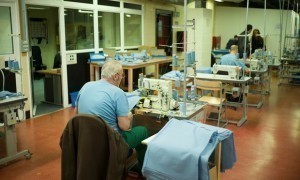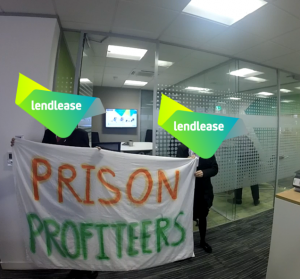Making Prisons Work: The Rising Tide of Prison Labour in the UK
 In the November 2016 Prison Safety and Reform White Paper, the then Justice Secretary, Liz Truss, set out what she intends to change about the criminal justice system. In short, the state wants to make ‘prisons work’. Turning ‘offender warehouses’ into ‘disciplined and purposeful centres of reform’.
In the November 2016 Prison Safety and Reform White Paper, the then Justice Secretary, Liz Truss, set out what she intends to change about the criminal justice system. In short, the state wants to make ‘prisons work’. Turning ‘offender warehouses’ into ‘disciplined and purposeful centres of reform’.
This article takes a critical look at these proposals and shares how we are facing a once-in-a-generation expansion of the prison estate and its ability to exploit prisoner labour. Thus strengthening its capacity to repress and control all those caught in its web – the working class, people of colour, immigrants, the homeless, queers, folks with mental health challenges, learning disabilities and all those that more often than not end up in the prison system.
If it’s one thing we have learned from members of IWOC that have been in prison it’s that prisons cannot function without the labour of prisoners. We cook the food, clean the wings, work at reception, do the laundry… Without us, prisons could not afford the cost of keeping us imprisoned. Prisoners working full time at a minimum will receive £6 a week. Prisoners working in workshops run by private companies may earn up to £25 per week if they are lucky. And now the State are laying the foundations for the escalation of the exploitation of prisoner labour for capitalist ends.
Reform Prisons
 Wrapped in liberal-pleasing reform rhetoric, what we are really seeing are some dangerous trends. The centerpiece of the Government’s white paper are their ‘Reform Prisons’. These are prototype prisons based on decentralised governance and a giant “open for business” sign at their gates. Similar to the dismantlement of the education sector, prison powers are soon to be devolved to Governors in these designated ‘reform prisons’. These Governors will have the power to hire and fire, decide on courses and programs, decide their budgets, and basically design the prison regime to suit whichever companies they are working with.
Wrapped in liberal-pleasing reform rhetoric, what we are really seeing are some dangerous trends. The centerpiece of the Government’s white paper are their ‘Reform Prisons’. These are prototype prisons based on decentralised governance and a giant “open for business” sign at their gates. Similar to the dismantlement of the education sector, prison powers are soon to be devolved to Governors in these designated ‘reform prisons’. These Governors will have the power to hire and fire, decide on courses and programs, decide their budgets, and basically design the prison regime to suit whichever companies they are working with.
Lizz Truss writes how, ‘They [Governors] will be able to design the prison day to meet commercial opportunities, rather than trying to shoehorn the prison day into a centrally prescribed timetable and to recruit the right staff to train prisoners and oversee the work. They will be able to target training and work to match more closely the needs of the local labour market.’ They will also be able to ‘reinvest the income they generate to deliver additional services or grow their employment offer.’
All of these plans will be solidified in a “Prisoner Employment Strategy” that is awaiting release. The White Paper already boasts of examples where prisoners have been successfully employed in call centres during their time inside and after release.
Liz Truss writes how “Prisoners represent a pool of untapped talent that employers can utilise to meet skills gaps across the UK”. Make no mistake, prisons are places of suffering and death – we are not here to serve the labour market, our bodies are not for sale.
A Captive Workforce
 Prisoners that work in prisons have no rights to organise, no contracts, no pensions, no right to choose what they do – they have no use of the gains that workers have fought and died for over centuries. If prisoners refuse to work they are punished via the IEP (Incentives and Earned Privileges Scheme), and can have visits, association (time outside in a courtyard or out of cell) and other ‘privileges’ take away from them.
Prisoners that work in prisons have no rights to organise, no contracts, no pensions, no right to choose what they do – they have no use of the gains that workers have fought and died for over centuries. If prisoners refuse to work they are punished via the IEP (Incentives and Earned Privileges Scheme), and can have visits, association (time outside in a courtyard or out of cell) and other ‘privileges’ take away from them.
They are the ultimate captive workforce for capitalist industries and have been used to break strikes, while simultaneously taking jobs out of communities and into prisons. Prison labour has been used as a tool for conquest and domination for centuries, from using convict labour to colonise countries, to putting prisoners to work in making goods for armies and war (and now prisons have contracts with the British Armed Forces, who knows what awaits us). The state is also capitalising on prison labour to exploit them for key infrastructural projects, such as CrossRail, once they are released.
Prison Expansion
 Older “victorian” jails are criticised for their lack of ‘useable space for reform facilities’ and so at the heart of the Governments 1.5 billion prison building program is the creation of prisons where workshops can take centre stage. At HMP Berwyn, the new super-prison in Wales, two large workshops to employ more than 800 prisoners are the bedrock of the prison. The £23 million per year in ‘local economic benefits’ is directly extrapolated from how much money companies can make from prison labour.
Older “victorian” jails are criticised for their lack of ‘useable space for reform facilities’ and so at the heart of the Governments 1.5 billion prison building program is the creation of prisons where workshops can take centre stage. At HMP Berwyn, the new super-prison in Wales, two large workshops to employ more than 800 prisoners are the bedrock of the prison. The £23 million per year in ‘local economic benefits’ is directly extrapolated from how much money companies can make from prison labour.
Right now the State are in the process of applying for planning permission for five new mega-prisons in Wellingborough, Leicester, Port Talbot, Wigan, Rochester and Full Sutton in East Yorkshire. Five new “community prisons” for women are also on the cards for 2017. Working with groups such as Community Action on Prison Expansion, IWOC is supporting grassroots resistance to these plans.
The role of IWOC WISE-RA
 We know that exploiting prison labour is nothing new, however, plans for levels at this size and scale across the UK is unprecedented. The number of hours worked in industry will become a ‘key performance indicator’ to evaluate prisons in Truss’s new Prison League Tables. This is a game changer and one that needs resisting.
We know that exploiting prison labour is nothing new, however, plans for levels at this size and scale across the UK is unprecedented. The number of hours worked in industry will become a ‘key performance indicator’ to evaluate prisons in Truss’s new Prison League Tables. This is a game changer and one that needs resisting.
In its desperate attempt to maintain a violent, racist, sexist institution like the prison service, the state and media work together to convince us that prisons are natural, normal and necessary and needed for our safety. IWOC have been doing public education work over the last year to try and support folks to unlearn and challenge these perspectives and build solidarity with prisoners and those affected by the prison system.
In our first year, we’ve faced significant censorship challenges that have thwarted our ability to help prisoners join our union or organise on their own terms. We are doing our best to overcome these challenges and connect with more prisoners and their families. If you know someone in jail who would like to get involved, please contact us. Likewise, we always need more organisers in our committee to do the background work that can make effective prisoner solidarity a reality.
 Instead of relying on the law, the courts and the politicians, all of which are complicit in the prison system and mass incarceration of our class, the I.W.W embraces direct action and the power of standing together in solidarity to fight for our collective demands. Unlike other unions, that simply fight for bigger pieces of the capitalist pie, the IWW’s vision is for a world without the wage system, without prisons and without capitalism and its alienating division of labour that steals our humanity.
Instead of relying on the law, the courts and the politicians, all of which are complicit in the prison system and mass incarceration of our class, the I.W.W embraces direct action and the power of standing together in solidarity to fight for our collective demands. Unlike other unions, that simply fight for bigger pieces of the capitalist pie, the IWW’s vision is for a world without the wage system, without prisons and without capitalism and its alienating division of labour that steals our humanity.
For more information and to get involved please visit: www.iwoc.iww.org.uk
Facebook: https://www.facebook.com/IWOCWISERA/
Email: iwoc@iww.org.uk

